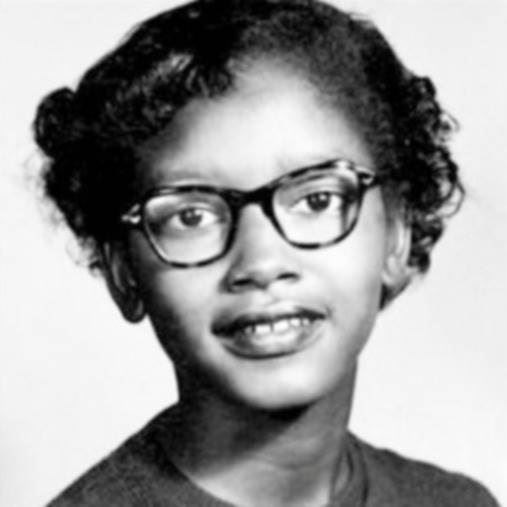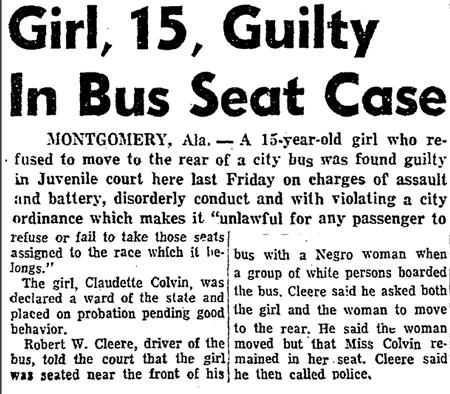 |
| (For The Unsung Heroes Of Black History Month. Odyssey, 8 Feb. 2016, www.theodysseyonline.com/unsu) |
The actor Christopher Reeve once said: "A hero is an ordinary individual who finds the strength to persevere and endure in spite of overwhelming obstacles" ("Christopher Reeve Quotes."). Reeve's quote states that heroes are not hard to be but are often hard to find. In today's world, heroes are not superhumans who can run fast or fly. They also are not people who act in movies or have an abundance of money. Heroes are afraid and uncertain of themselves yet they are courageous and brave. They are sometimes just regular people who find it in themselves to be courageous and brave in order to help improve the world around them. A hero is someone who is courageous, strong willed and has perseverance. Many ordinary men, women and children can be considered heroes.
Claudette Colvin, an African American woman who was a child during the civil rights movement, meets the definition of a hero. Colvin was born in September 5, 1939 in Birmingham, Alabama. When she was young, she was sent to live with her great aunt and uncle, whom she called "Mom" and "Dad". Claudette and her family later moved to Montgomery with Claudette's younger sister, Delphine, who later died of polio on Claudette's 13th birthday. Delphine's death left Claudette extremely sensitive and emotional. Upon entering high school, Claudette began to learn of and see the injustice in her world. On March 2, 1955, at 15 years old, she refused to give up her seat on a bus to a white woman. When Claudette refused to leave her seat, she was dragged off the bus and arrested for assaulting a police officer and breaking segregation laws. A year after her arrest, Claudette acted as a plaintiff in the class-action lawsuit Browder v. Gale, which was a lawsuit dealing with segregation on buses. This famous court case later became the reason for integrated buses in Alabama. Throughout her life, Claudette met the definition of a hero. She had courage, possessed strong will, and had the ability to persevere. Claudette Colvin demonstrated her courage by standing up for her rights and the rights of African Americans by not giving up her seat on the bus. She then had the strong will and persevered to follow through with the court case to help the resistance against prejudice and thus proved herself a hero.
 |
| A newspaper clipping abut Claudette's arrest. (“Black Quotidian: Introduction.†Black Quotidian: Everyday History in African-American Newspapers, b) |
Throughout her life, Claudette faced challenges due to segregation, yet she was extremely courageous in the midst of the racial discrimination during the civil rights movement. Virginia Durr, a white and wealthy supporter of the National Association for the Advancement of Colored People (NAACP), acknowledged Claudette's courage, saying that: "It was a miracle. Even after being deserted [on the bus] by her other companions, she still would not move. In this setting and in this town and with four big burly white men threatening her- isn't that amazing"(Hoose)? Durr realized how difficult it must have been for Claudette to encounter prejudice at such a young age. Claudette's actions spoke volumes to many people who encountered the same hardships she endured. Her courage inspired others to speak out. Claudette's actions thus confirm she is a hero. These actions display her courage to confront the injustice she had been facing. When Claudette refused to give up her seat, she exemplified her courage. "They came to me and stood over me and one said, 'Aren't you going to get up?' I said, 'No, sir.' He shouted 'Get up' again. I started crying, but I felt even more defiant. I kept saying over and over, in my high-pitched voice, 'It's my constitutional right to sit here as much as that lady. I paid my fare, It's my constitutional right!' I knew I was talking back to a white policeman, but I had enough" (Hoose). Despite her fear, Claudette stood up for her rights hence validating herself a hero. Her defiance displayed the courage that she had in order to face discrimination. Her brave and courageous actions at such a young age help define Claudette as a hero.
Amid all of the negativity and general criticism of her refusal to give up her seat, Claudette remained strong willed to continue doing the right thing for not only her, but for the population of African Americans facing racism during that time. After her arrest, Claudette recalled: " I felt happy and proud. I had been talking about getting our rights ever since Jeremiah Reeves was arrested, and know they knew I was serious" (Hoose). When Claudette first saw the injustice, she and countless of her peers encountered, she took it in her own hands to try and change it. Even after she knew it was dangerous for her to speak out, she kept to her morals and kept pushing forward. It was heroic of her to speak out because she never doubted her beliefs and did not mind that others thought her promise to fight was unsupported. As Colvin reflected on her actions, she recalled, "All I remember is that I was not going to walk off the bus voluntarily"(Alder). Her will to keep fighting, even while being arrested is quite heroic. Her actions authenticate her heroic qualities because she stayed seated while others around her ridiculed her for her beliefs. Her strength to stay on the bus while being harassed and arrested supports that Claudette had strong will and is a hero.
Claudette faced injustice and her ability to persevere is one of the most motivating things about her. After she lost her case and returned to school, she faced harassment from her school mates (Hoose). Even after all she had experienced, Colvin kept moving forward. Claudette was able to persevere after all she had gone through to once again fight for justice. This proves her to be heroic, because it is so much easier just to give up, but Claudette still kept going. Before participating in the Browder v. Gale case, Claudette knew the dangers awaiting. " You never knew who was KKK, or who would target you" (Hoose). In the South, and the rest of the country at the time, many African Americans were targeted by white supremacist groups. Claudette's attack on the segregation laws in the Browder v. Gale case left her and her family at risk of being targeted, but she still agreed to testify. Claudette still kept fighting for the rights of African Americans, proving that she was able to overcome the dangerous time to keep moving forward. Her ability to overcome her struggles in her past is awe inspiring. Claudette's actions, display her tremendous courage, strong will, and ability to persevere. These actions have made her a hero in my eyes. Claudette has inspired me to always speak out when there is something that I think is wrong. She also inspired me to never let anyone push me, or anyone around me, down because of being perceived as different. "'When you have a gut feeling that things aren't right and unfair, you should speak out,' she says. 'If you have to stand up alone, stand up alone'" ("Who is the girl who came before Rosa Parks"). And who knows, we may have not have the Rosa Parks as we know her today without Claudette Colvin, who inspired so many others to speak out. (Claudette Colvin: an unsung hero in the Montgomery Bus Boycott) Works Cited Adler, Margot, and Phillip Hoose. "Before Rosa Parks, There Was Claudette Colvin."NPR. NPR,15 Mar.2009. Web. 04 May 2017. "Black Quotidian: Introduction." Black Quotidian: Everyday History in African-American Newspapers, blackquotidian.com/anvc/black-quotidian/introduction. Accessed 16 May 2017. "Christopher Reeve Quotes." BrainyQuote. Xplore, n.d. Web. 14 May 2017. Hoose, Phillip M. Claudette Colvin: Twice toward Justice. New York, Farrar Straus Giroux, 2014. Who is the girl who came before Rosa Parks?" New Moon Girls, Mar.-Apr. 2011, p. 33. Student Resource in Context, link.galegroup.com/apps/doc/A267034011/SUIC?u=powa9245&xid=2c253c67. Accessed 1 May 2017. "For The Unsung Heroes Of Black History Month." Odyssey, 8 Feb. 2016, www.theodysseyonline.com/unsung-heroes-black-history-month-claudette-colvin. Accessed 17 May 2017.
Page created on 5/26/2017 12:00:00 AM
Last edited 5/26/2017 12:00:00 AM
